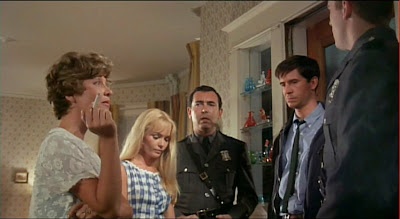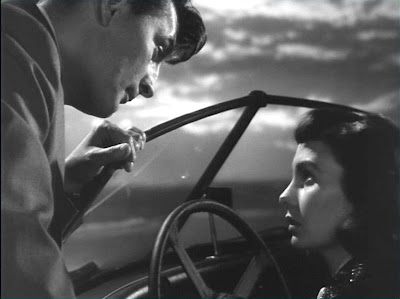For as long as I can remember, I've been intrigued by films whose
themes dramatize a perception of reality I have held since my teens: the banality of evil. A term first coined in 1963 by political theorist Hannah
Arendt in her Holocaust trial book Eichmann in Jerusalem: A Report on the Banality of Evil, it's a theory that has
gone on to signify many things, most persistently for me—the notion of wickedness thriving
in the most innocuous of environments.
Rosemary's Baby found
Satanic evil lurking behind the everyday meddlesome intrusions of nosy
neighbors; The Stepford Wives exposed the murderous misogyny cloaked within patriarchal
social systems; and Andy Warhol's Bad
used basic-black comedy to satirize the lethal side of suburban materialism. In
Pretty Poison, a bizarre little chiller
that slipped past audiences in 1968 but has since developed a loyal cult
following, first-time director Noel Black (with an award-winning screenplay by Lorenzo Semple, Jr. adapted from the novel, She Let Him Continue by Stephen Geller) treads a path well-worn by directors
as diverse as Alfred Hitchcock (Shadow of a Doubt) and David Lynch (Blue Velvet):
the dark underside of small-town life.
 |
| Anthony Perkins as Dennis Pitt |
 |
| Tuesday Weld as Sue Ann Stepanek |
 |
| Beverly Garland as Mrs. Stepanek |
Anthony Perkins is Dennis Pitt, a recently-released-from-a-mental-institution
loner (for the arson death of his aunt when he was 15) with, to put it
charitably, a tenuous grip on reality. A pathological liar, albeit not a particularly accomplished one, Pitt is given to flights of espionage fantasy so
elaborate, one is never quite sure…least of all Dennis himself…if he knows he's lying or not. Into his peculiar orbit comes drill team flag-bearer Sue Ann Stepanek, a 17-year-old high-schooler
every bit as wholesome and unrefined as her name.
Convincing the gullible Sue Ann that he's a CIA agent on a
covert mission to investigate environmental crimes committed by the chemical plant where he's employed, the delusional Pitt fancies himself the city
slicker to Sue Ann's easily-seduced farmer's daughter. Unfortunately, it isn't
long before things grimly escalate in this bizarre game of "Who's zooming who?" - a game that finds the hunter,
a tad slow on the uptake, discovering he has been captured by the game.
WHAT I LOVE ABOUT
THIS FILM
One of my strongest memories of being a pre-teen in the
late '60s was the prevailing, almost oppressive sense (from movies, television
shows, and newspaper articles) that America was in a tumultuous state of self-reflection. After so many years of looking outside ourselves at Germany, Russia, Japan,
and the vague specter of communism as this monolith of absolute evil out to
overthrow our just and unsullied American Way of Life; the ethical and moral
morass that was the Vietnam War—coupled with the rash of political assassinations,
civil-rights related violence, and campus rioting exploding throughout the country—posed
the discomforting postulate that we were now living in an age when what we most had to fear was ourselves.
Movies as dissimilar and ostensibly politically benign as Last Summer, Rosemary's Baby, Bonnie and Clyde, Petulia, Angel Angel Down We Go, Easy Rider, They Shoot Horses, Don't They? The Parallax
View, and Targets, all reflected the late-'60s zeitgeist: ambiguity about and disillusion
with the beliefs, conventions, and institutions in which we once placed our absolute trust.
For a time, it felt as though everything clean and shiny about American culture was revealing itself to have an underside of decay and rot. Pretty Poison, a film whose title even captures this sense of wary disquietude, gives us a film that appears on the surface to be a harmless, anarchic black comedy about misfit youth, but is, in fact, a twisted and rather unexpected tale where nothing is as it seems and good intentions don't amount to very much.
 |
| Dennis studying a vial of the chemical his plant produces whose waste pollutes the river and nearby lake...or is he thinking of Sue Ann? |
American films in the sixties were obsessed with unearthing the villains who presented themselves as the clean-cut upholders of family values; in exposing the hypocrisy behind the small-town bastions of normalcy and conformity; and in confronting the violent institutions and belief systems that casually traded lies for lives in the belief that something real was being defended. Films like Pretty Poison—films that sought to explore the enemy within—asked audiences to take a good look at what America had become.
Whether Anthony Perkins and Tuesday
Weld deconstruct or merely exploit their trademarked screen personas in Pretty Poison is debatable. But what is clear is that
in assuming roles that both recall and add unexpected twists to past performances for which they've become
indelibly linked in the public's mind (Psycho's unhinged Norman
Bates for Perkins, Lord Love a Duck's covetous co-ed Barbara Ann Greene for Weld), Perkins and Weld—who share an electric chemistry—take audience preconceptions
and make us choke on them.
 |
| It begins to dawn on Dennis that Sue Ann is something of a force to be reckoned with |
On the contrary, despite being labeled a "neurotic" by Pretty Poison co-star John Randolph and said to have been frequently in tearful hysterics during the filming, Tuesday Weld gives a masterfully canny performance in the film. One that is, at turns, both charming and chilling. She's mesmerizingly good, her performance here ranks among the best of her career. And at almost 25 years of age at the time and playing 17, she somehow manages to get away with it...her preternatural physical development hinting at a shrouded psychological maturity.
 |
| Roger Corman stalwart (and personal fave), the consistently excellent Beverly Garland is a particular standout as Sue Ann's brassy mother. |
 |
| John Randolph plays Dennis' appropriately concerned case officer, Morton Azenauer |
THE STUFF OF FANTASY
Adding to Pretty Poison's already considerable quirk factor are the odd ways in which Pretty Poison's plot intersects with Tuesday Weld's 1966 teen-culture spoof Lord Love a Duck and Weld's real life. Spoler note: If
you haven't yet seen Pretty Poison, you may want to skip over this section.
Pretty Poison / Lord Love a Duck / Real life
Pretty Poison / Lord Love a Duck / Real life
The ageless, feckless men Weld manipulates in both films
are portrayed by actors (Perkins, Roddy McDowall) who, in real life were closeted
gay men. In 1972, Tuesday Weld and Anthony Perkins reteamed for the film Play it As It Lays, in which Weld portrayed an actress suffering a nervous breakdown and Perkins her gay best friend, a suicidal film director. In real life, the depressive Anthony Perkins was indeed Weld's good friend and directed two films...one of them being the last-straw sequel Psycho III.
The Lord Love a Duck connection finds Weld marrying the assistant of her good friend Roddy McDowall in 1965, only to discover that her new husband also happened to have been McDowall's lover.
Pretty Poison / Lord Love a Duck
The Lord Love a Duck connection finds Weld marrying the assistant of her good friend Roddy McDowall in 1965, only to discover that her new husband also happened to have been McDowall's lover.
Pretty Poison / Lord Love a Duck
Weld's character in both films is a dissatisfied, disaffected high-school senior who comes under the influence of a strange man whom she can manipulate into helping her out with her "problems."
Pretty Poison / Lord Love a Duck
In both films, Weld's character rises like a phoenix from the
ashes while her male compatriot rots in prison.
Pretty Poison / How Awful About Allan
In Pretty Poison
and the 1970 TV movie, How Awful About
Allan, Anthony Perkins plays a man who, in his youth, causes the accidental death of a relative by fire. Both roles cast the twitchy actor as a potential villain, only later to reveal him as a victim of a complex, calculated scheme.
THE STUFF OF DREAMS
I was simply floored by Pretty Poison and still consider it to be a film far superior and more frightening than some of the more high-profile films with similar themes (Badlands, Kalifornia, Natural Born Killers). There's really much to recommend it, not the least being a '60s vibe that somehow doesn't feel dated, and, most gratifyingly, top-notch lead performances by two of Hollywood's more charismatic (if idiosyncratic) stars.
BONUS MATERIAL
In 1996, Pretty Poison was made into a pedestrian TV movie of profound mediocrity. All plot, no subtext.
Happily, Noel Black's Pretty Poison is available on DVD. Unfortunately, the U.S. version is without the director's commentary on the UK DVD release.
Copyright © Ken Anderson 2009 - 2013
THE STUFF OF DREAMS
I was simply floored by Pretty Poison and still consider it to be a film far superior and more frightening than some of the more high-profile films with similar themes (Badlands, Kalifornia, Natural Born Killers). There's really much to recommend it, not the least being a '60s vibe that somehow doesn't feel dated, and, most gratifyingly, top-notch lead performances by two of Hollywood's more charismatic (if idiosyncratic) stars.
 |
| She Let Him Continue "I was such a fool, Mr. Azenauer. I let him go on even after I knew he was crazy..." |
BONUS MATERIAL
In 1996, Pretty Poison was made into a pedestrian TV movie of profound mediocrity. All plot, no subtext.
Happily, Noel Black's Pretty Poison is available on DVD. Unfortunately, the U.S. version is without the director's commentary on the UK DVD release.
Copyright © Ken Anderson 2009 - 2013









.JPG)




.JPG)





































.JPG)
.JPG)
